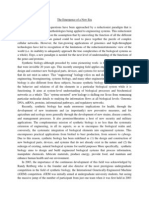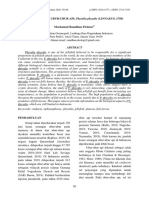0 ratings0% found this document useful (0 votes)
104 viewsTabel Perbedaan Anggota Platyhelminthes
Tabel Perbedaan Anggota Platyhelminthes
Uploaded by
Rio YuhanataKresna Wahyu Arie Pradhana is a student with NIM 180210103090 in Class C. The document provides a table comparing the key differences between three classes of flatworms: Turbellaria, Trematoda, and Cestoda. The table outlines their body shape, surface, suction/digestive organs, segmentation, habitat, digestion, nervous system, motion, excretion, respiration, reproduction, food source, and other distinguishing characteristics.
Copyright:
© All Rights Reserved
Available Formats
Download as DOCX, PDF, TXT or read online from Scribd
Tabel Perbedaan Anggota Platyhelminthes
Tabel Perbedaan Anggota Platyhelminthes
Uploaded by
Rio Yuhanata0 ratings0% found this document useful (0 votes)
104 views3 pagesKresna Wahyu Arie Pradhana is a student with NIM 180210103090 in Class C. The document provides a table comparing the key differences between three classes of flatworms: Turbellaria, Trematoda, and Cestoda. The table outlines their body shape, surface, suction/digestive organs, segmentation, habitat, digestion, nervous system, motion, excretion, respiration, reproduction, food source, and other distinguishing characteristics.
Original Title
Tabel Perbedaan Anggota Platyhelminthes.docx
Copyright
© © All Rights Reserved
Available Formats
DOCX, PDF, TXT or read online from Scribd
Share this document
Did you find this document useful?
Is this content inappropriate?
Kresna Wahyu Arie Pradhana is a student with NIM 180210103090 in Class C. The document provides a table comparing the key differences between three classes of flatworms: Turbellaria, Trematoda, and Cestoda. The table outlines their body shape, surface, suction/digestive organs, segmentation, habitat, digestion, nervous system, motion, excretion, respiration, reproduction, food source, and other distinguishing characteristics.
Copyright:
© All Rights Reserved
Available Formats
Download as DOCX, PDF, TXT or read online from Scribd
Download as docx, pdf, or txt
0 ratings0% found this document useful (0 votes)
104 views3 pagesTabel Perbedaan Anggota Platyhelminthes
Tabel Perbedaan Anggota Platyhelminthes
Uploaded by
Rio YuhanataKresna Wahyu Arie Pradhana is a student with NIM 180210103090 in Class C. The document provides a table comparing the key differences between three classes of flatworms: Turbellaria, Trematoda, and Cestoda. The table outlines their body shape, surface, suction/digestive organs, segmentation, habitat, digestion, nervous system, motion, excretion, respiration, reproduction, food source, and other distinguishing characteristics.
Copyright:
© All Rights Reserved
Available Formats
Download as DOCX, PDF, TXT or read online from Scribd
Download as docx, pdf, or txt
You are on page 1of 3
Name : Kresna Wahyu Arie Pradhana
NIM : 180210103090
Class : C
A table of the differences between classes in Platyhelminthes
Turbellaria Trematoda Cestoda
Other name Hairy worm Suction worm Tapeworm
Body shape Short flat Short flat Flat body, jagged
Body surface Ciliated body, No ciliated, cuticle No ciliated, cuticle
covered by epidermis covered, no covered, no
epidermis epidermis
Suction No suction There are two (in the There are four
mouth and head) skoleks
Have a suction
device (around the
mouth/ventral part)
equipped with chitin
teeth
Segmentation No segmentation No segmentation There is
Body length 5-25 cm segmentation
The eye point is The cestoda body
located in the dorsal consists of a skoleks
part of the head (head) with rostelum
The mouth is located (four suction
at the end of the devices) with hooks
esophagus which can composed of chitin,
be extended to catch proglotid (segments
food or body segments)
Adult worms have
genital pores behind
the mouth
Way of life Free, carnivore Parasites Parasites in the
human digestive tract
Larva habitat Free in fresh water In the snail genus On pork
Lymnea
Adult habitat Free in fresh water Sheep and human Human
gallbladder
Digestion No digestion Mouth, muscular Lack of mouth and
pharynx, short digestive tract
esophagus, and short,
two-pronged
intestines
Nervous system Rope ladder, two eye The rope ladder Rope ladder
spots and auricle nervous system is
composed of
multiple ganglia near
the esophagus, two
dorsal nerves (back)
and various nerve
fibers
Motion tool Cilia, using muscles No motion tool No motion tool
with wave-like
movements (in the
ventral epidermis)
Excretion tool Fire cell Fire cell Fire cell
Respiration Osmosis Osmosis Osmosis
Reproduction Asexual by way of Sexual Hermaphrodite
transverse or fragmentation
longitudinal division
Sexual by copulation
Food No food Animal tissue or Taken from the host
body fluids by absorbing through
the surface of the
body
You might also like
- Ant Internal Anatomy DiagramDocument4 pagesAnt Internal Anatomy DiagramHfNo ratings yet
- Gambar 3.2. Anatomi Rongga Mulut Kadal (Eutropis Multifasciata) Keterangan GambarDocument5 pagesGambar 3.2. Anatomi Rongga Mulut Kadal (Eutropis Multifasciata) Keterangan GambarrefestufuNo ratings yet
- Lecture 4Document32 pagesLecture 4Neo ChanNo ratings yet
- Hasil Pengamatan FixDocument9 pagesHasil Pengamatan FixAmelNo ratings yet
- 10486-ID-etnobotani-rotan-sebagai-bahan-kerajinan-anyaman-masyarakat-sekitar-kawasan-tama PDFDocument10 pages10486-ID-etnobotani-rotan-sebagai-bahan-kerajinan-anyaman-masyarakat-sekitar-kawasan-tama PDFAdilhaJhaNo ratings yet
- Laju Respirasi HewanDocument8 pagesLaju Respirasi HewanAqsha InezaNo ratings yet
- Keanekaragaman - Tumbuhan HewanDocument25 pagesKeanekaragaman - Tumbuhan HewanMochamad Sabilal MuhtadinNo ratings yet
- Contoh Essay Biologi MolekulerDocument4 pagesContoh Essay Biologi MolekulerImam Taufiq RamadhanNo ratings yet
- Laporan PKL Ektum FixDocument141 pagesLaporan PKL Ektum FixSriayu JootjelopoNo ratings yet
- Data Pengamatan Embrio AyamDocument5 pagesData Pengamatan Embrio AyamdindaNo ratings yet
- Laporan Sistem SirkulasiDocument10 pagesLaporan Sistem SirkulasiRosa AmaliaNo ratings yet
- Struktur Morfologi Dan Anatomi Burung Endemik Sulawesi Cabai Panggul-Kelabu (Dicaeum Celebicum Műller, 1843)Document7 pagesStruktur Morfologi Dan Anatomi Burung Endemik Sulawesi Cabai Panggul-Kelabu (Dicaeum Celebicum Műller, 1843)SaadatulNo ratings yet
- Anatomi Organ AkarDocument32 pagesAnatomi Organ AkarDevon SimdayNo ratings yet
- 2006dhe PDFDocument123 pages2006dhe PDFZahra Salsa BilaNo ratings yet
- Jurnal Suksesi Ekologi KiyahhhhhDocument3 pagesJurnal Suksesi Ekologi KiyahhhhhMelda Aprilya SolinNo ratings yet
- (Revisi Terbaru) Kelimpahan Gastropoda Dan Bivalvia Di Daerah MakroalgaDocument10 pages(Revisi Terbaru) Kelimpahan Gastropoda Dan Bivalvia Di Daerah Makroalgashabrina syifaNo ratings yet
- Strategi Perencanaan Dan Pengembangan Objek Wisata (Studi Kasus Pantai Pangandaran Kabupaten Ciamis Jawa Barat) Marceilla HidayatDocument12 pagesStrategi Perencanaan Dan Pengembangan Objek Wisata (Studi Kasus Pantai Pangandaran Kabupaten Ciamis Jawa Barat) Marceilla HidayatRamadhani NadhiaNo ratings yet
- Pengantar NanobiologiDocument47 pagesPengantar NanobiologiInnes Putri MonikaNo ratings yet
- Shipbuilding Dan Service 2 - Semarang (Sesi 1 4)Document97 pagesShipbuilding Dan Service 2 - Semarang (Sesi 1 4)Masabu 44No ratings yet
- Clone: By: Name: Fitria Ramadhani Ayuningtyas Class: D Student ID: B1B017046Document5 pagesClone: By: Name: Fitria Ramadhani Ayuningtyas Class: D Student ID: B1B017046Fitria RamadhaniNo ratings yet
- Genus: Rosa: FamilyDocument5 pagesGenus: Rosa: FamilyMakara MeanNo ratings yet
- SExl FSDocument93 pagesSExl FSMas Joko100% (1)
- Uji Daya Tumbuh Stek Tanaman Alpukat (Perseaamericana Mill) DENGAN PEMBERIAN BIO ZPT URINE KambingDocument21 pagesUji Daya Tumbuh Stek Tanaman Alpukat (Perseaamericana Mill) DENGAN PEMBERIAN BIO ZPT URINE Kambingdikidbandto11No ratings yet
- Identifikasi Jenis Tupai (Tupaia SP.) Di Hutan Tembawang Desa Mensiku Bersatu Kecamatan Binjai Hulu Kabupaten SintangDocument7 pagesIdentifikasi Jenis Tupai (Tupaia SP.) Di Hutan Tembawang Desa Mensiku Bersatu Kecamatan Binjai Hulu Kabupaten Sintangela safiraNo ratings yet
- Aspek Bio-Ekologi Dan Pemanfaatan Kerang Marga Anadara (Mollusca: Bivalvia: Arcidae)Document17 pagesAspek Bio-Ekologi Dan Pemanfaatan Kerang Marga Anadara (Mollusca: Bivalvia: Arcidae)SabrinaNo ratings yet
- PDF SoshumDocument123 pagesPDF SoshumJannatul JasmineNo ratings yet
- Bio EditDocument6 pagesBio EditMaretra Anindya PuspaningrumNo ratings yet
- ASPEK BIOLOGI UBUR-UBUR API, Physalia Physalis (LINNAEUS, 1758)Document19 pagesASPEK BIOLOGI UBUR-UBUR API, Physalia Physalis (LINNAEUS, 1758)bakin muNo ratings yet
- Data Pengamatan Embrio AyamDocument5 pagesData Pengamatan Embrio AyamdindaNo ratings yet
- Campuran Media Dan Hormon Tumbuh Pada Stek Daun Tanaman Hias Indoor ZAMIO CURCAS (Zamioculcas Zamiifolia)Document13 pagesCampuran Media Dan Hormon Tumbuh Pada Stek Daun Tanaman Hias Indoor ZAMIO CURCAS (Zamioculcas Zamiifolia)husnulkNo ratings yet
- Pengertian, Sejarah Dan Aplikasi Kultur JaringanDocument20 pagesPengertian, Sejarah Dan Aplikasi Kultur JaringanUsman MaukNo ratings yet
- KlasifikasiDocument25 pagesKlasifikasiRunoff0% (1)
- JurnalDocument20 pagesJurnalDewi sabrina AmaliaNo ratings yet
- Laprak Ekoum Estimasi Populasi Why Final Revisi Fix RemasteredDocument18 pagesLaprak Ekoum Estimasi Populasi Why Final Revisi Fix RemasteredWhy100% (1)
- Tabel Klasifikasi Dan Pengamatan RhodoDocument6 pagesTabel Klasifikasi Dan Pengamatan RhodoriskaNo ratings yet
- Nama Kelas Tempat Lahir Tanggal Lahir Nama Ayah Nama Ibu: No Anak Ke-Jumlah SaudaraDocument5 pagesNama Kelas Tempat Lahir Tanggal Lahir Nama Ayah Nama Ibu: No Anak Ke-Jumlah SaudaraMuhammad RaihanNo ratings yet
- Kelompok 3-SIstem PencernaanDocument103 pagesKelompok 3-SIstem PencernaanNurul Fadhillah IsaNo ratings yet
- Anggun Wening F - 1304617073 - Biolistrik Pada Sistem SarafDocument8 pagesAnggun Wening F - 1304617073 - Biolistrik Pada Sistem SarafRosa AmaliaNo ratings yet
- Gambaran Anatomi Dan Histologi Oesofagus Dan Proventrikulus Pada Ayam Hutan Merah (Gallus Gallus) Asal Pulau TimorDocument19 pagesGambaran Anatomi Dan Histologi Oesofagus Dan Proventrikulus Pada Ayam Hutan Merah (Gallus Gallus) Asal Pulau TimorMuhammad Gaidar AliNo ratings yet
- Identifikasi Tumbuhan Lumut (Bryophyta) Di Sekitar Air Terjun Sigerincing Dusun Tuo, Kecamatan Lembah Masurai, Kabupaten MeranginDocument6 pagesIdentifikasi Tumbuhan Lumut (Bryophyta) Di Sekitar Air Terjun Sigerincing Dusun Tuo, Kecamatan Lembah Masurai, Kabupaten MeranginTiara PutrianaNo ratings yet
- Klasifikasi MoluscaDocument3 pagesKlasifikasi MoluscaRizki ChandraNo ratings yet
- Keanekaragaman Spesies Tumbuhan Asing Invasif Di K PDFDocument104 pagesKeanekaragaman Spesies Tumbuhan Asing Invasif Di K PDFIdham CholidNo ratings yet
- Klasifikasi LichenDocument5 pagesKlasifikasi LichenwidyaNo ratings yet
- Skripsi. Kemasan AktifDocument52 pagesSkripsi. Kemasan AktifGalni karangoraNo ratings yet
- Assesment On Release of Transgenic Rice Plant in IndonesiaDocument6 pagesAssesment On Release of Transgenic Rice Plant in Indonesiasyamsul0605No ratings yet
- Jurnal Siklus KarbonDocument13 pagesJurnal Siklus KarbonKhina ChyaNkk Khirah100% (1)
- VARIASI MORFOLOGI LIMA POPULASI Meretrix Spp. (Bivalvia:Veneridae) Di IndonesiaDocument12 pagesVARIASI MORFOLOGI LIMA POPULASI Meretrix Spp. (Bivalvia:Veneridae) Di Indonesiarzq rhmhNo ratings yet
- 2 Tinjauan Pustaka MelatiDocument31 pages2 Tinjauan Pustaka MelatiAsfi Ni'amNo ratings yet
- Filum Protozoa Dan PoriferaDocument5 pagesFilum Protozoa Dan PoriferaDidik PrasetyaNo ratings yet
- Perkecambahan MahoniDocument10 pagesPerkecambahan MahoniLutfi Ghonim SiagianNo ratings yet
- Cemara Pua-Pua: Klasifikasi IlmiahDocument2 pagesCemara Pua-Pua: Klasifikasi IlmiahdaniaNo ratings yet
- Pupuk Hayati (Biofertilizers) DanDocument56 pagesPupuk Hayati (Biofertilizers) DanMuhammad FadilNo ratings yet
- Jurnal CacingDocument9 pagesJurnal CacingshafiracheepyNo ratings yet
- Tri Wahyu Subekti - Praktikum 11Document5 pagesTri Wahyu Subekti - Praktikum 11Tri Wahyu SubektiNo ratings yet
- E-Jurnal 1Document4 pagesE-Jurnal 1abdi satriaNo ratings yet
- Hsslive Xi Zoology 03-Structural Organisation 2023Document7 pagesHsslive Xi Zoology 03-Structural Organisation 2023Babu Rahul KumarNo ratings yet
- Class XI, Chp4-Animal Kingdom-1Document5 pagesClass XI, Chp4-Animal Kingdom-1anirudhgupta5050No ratings yet
- 08 Chapter 4 Animal KingdomDocument11 pages08 Chapter 4 Animal KingdomAnusree M.SNo ratings yet
- CockroachDocument12 pagesCockroachjdevadiga084No ratings yet
- Results Anatomy Shellfish LabDocument17 pagesResults Anatomy Shellfish LabSyafiqa UmairahNo ratings yet



























































